Report on Dispatch to Cameroon -Groundwork for the study, including fostering research
Koji Hayashi
Specially Appointed Research Fellow
The Center for African Area Studies
Kyoto University
From February 4 to March 14, 2023, I traveled to the Republic of Cameroon. The study was conducted in the following areas: 1) In Yaoundé,the capital of Cameroon, I visitedthe Department of Anthropology of the University of YaoundéIto exchange views with our counterparts, Associate Professor Antoine Socpa and Professor Takada, and other Japanese researchers on the concept of this project and the future research possibilities. We also visited Tam-Tam Mobile, a non-governmental organization (NGO). 2) In Lomié, a city in the Eastern Province, fieldwork was conducted in and around a village of Baka Pygmies (hereafter referred to as “Baka”) who live on the outskirts of the city to observe their subsistence activities and child rearing. 3) in the eastern province of Lomié. In addition, we visited the NGO mutcare, Association Okani, in Bertoua, the capital of the Eastern Province, and held a research meeting. The following is a summary of the main topics covered.
1) Yaoundé
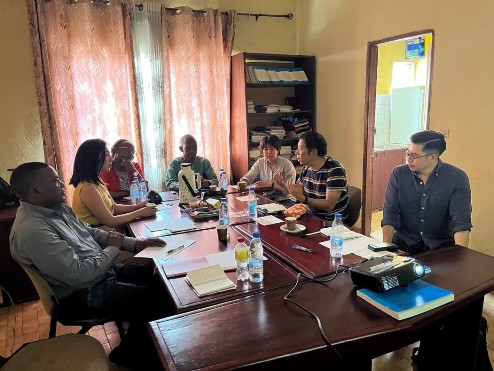
I visited the Department of Anthropology at the University of YaoundéI with the representative of this project, Professor Takada, and others, and exchanged opinions with our counterpart, Associate Professor Antoine Socpa, his colleagues, and graduate students on the concept of this project and future research possibilities in Cameroon (Photo 1). We also visited a slum area guided by a member of Tam Tam Mobile, a local NGO, to view an overview of the living environment based on the sanitation situation, including garbage, toilets, and water supply, and to inspect an elementary school in the target area. After that, the first on-site workshop was held at the office of Tam Tam Mobile. In this workshop, I made a presentation on the future direction of the research based on the progress of the field survey in the Eastern Province, and exchanged opinions on the possibility of collaboration with Tam Tam Mobile in Cameroon, led by Professor Takada on the details of the project (Photo 2). In the future, we can expect to receive introductions to educational and support facilities for children and people with disabilities in Yaoundé, as well as related organizations and researchers.
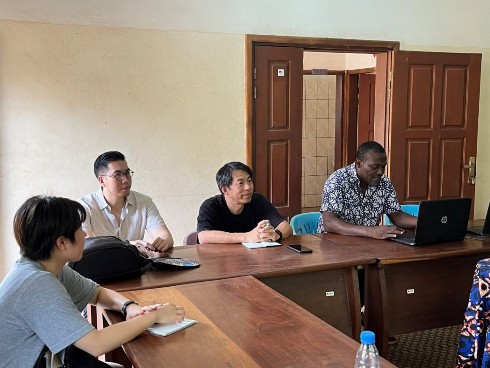
2) Lomié, a city in the Eastern Province
The Baka settlement on the outskirts of Lomiéwas outlined in the previous Cameroon dispatch report (2022/8/25-9/10), and during this stay, attention was paid to the ways of relating to children, including child-rearing behaviors, while focusing on households with children, mainly infants and toddlers, in the three settlements.
In addition to updating the household surveys that had been conducted in the past in the three villages, efforts were made to understand the daily lifestyle of the households, particularly focusing on younger children, including infants, based on how they interact with their parents, siblings, and relatives. Through the observation, it was observed that although infants (0-1 years old) with breastfeeding inevitably spent most of their time with their mothers, during their stay in the settlement, their husbands and close relatives in the settlement actively cared for them through physical contact such as holding them in their arms. During the survey period, which fell in the dry season, the most distinctive livelihood activities were the clearing of slash-and-burn fields around the village and a group fishing activity conducted by women in the nearby river (called “guma”). During the study period, I conducted a follow-up survey of infants for a few hours at a time, and was impressed by the natural practice of giving up the infants during these activities, except when traveling in the fields or forests, and leaving them in the care of another person (husband, mother, another child, or other relative) who accompanied the infant. During the raking, an infant (a boy about 6 months old), who could not yet walk by himself, was playing by himself with fallen branches, stones, mud, etc., covered with mud by the water’s edge beside his mother who was working hard. While observing the mother, the reporter sometimes felt that the child was in danger, but it was apparent that the mother’s relatives, including the younger child, were taking care of the child from time to time, keeping him away from danger of injury (Photo 3).
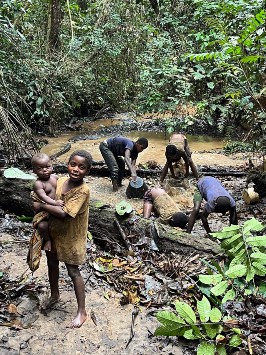
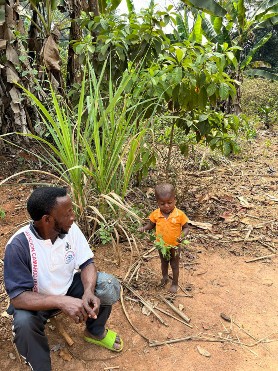
When I observed a one-and-a-half-year-old boy who had begun to walk by himself in the village, I observed that while he freely walked around the house and village and played by himself without active attention from either parent, he also exchanged rudimentary words with his parents and relatives in the village and tried to match language in objects and actions (Photo 4).
Although I have conducted numerous individual tracking studies on adults of the Baka in the past, this was almost the first time to concentrate on behavior observation of children, including infants and toddlers, as was done in this study. The project is also envisioned to focus on child-rearing behavior in the context of living environment and customs, and language acquisition by children, but it was meaningful that I was able to observe some aspects of this behavior and identify possibilities for future research.
In the future, it will be necessary to narrow down the focus of the research to individual research subjects, while understanding the social characteristics of seasonal subsistence activities and communities and groups, and incorporating a systematic perspective that includes the surrounding environment and relationships among neighboring farmers.
3) Bertoua, the capital of the Eastern Province
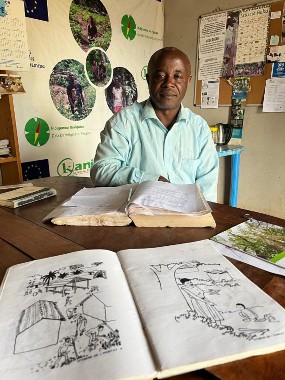
During a visit to Beltoa at the end of my stay in Cameroon, I met again with Mr. Charles Zobome, representative of the NGO mutcare, and exchanged views on holding an international workshop in Bertoua in September 2023, as well as on how to present the results of the research in an academic paper and to the local residents. We also exchanged opinions on how to present the results of the research in academic papers and to local residents. And I also met with Mr. Benant Messe, representative of the Association Okani (Okani), another NGO, and exchanged views on holding a joint international workshop with mutcare, joint writing of academic papers, and publication of a picture book, as described above. Mr. Messe showed us a booklet of vocabulary in Baka only, which was the result of Okani’s previous activities in collaboration with other institutions, as well as a design book and a picture book to communicate Baka life and culture (Photo 5). Mr. Messe expressed his desire for a Japanese-made publication with more complete content and higher quality paper, printing, and bookbinding, which he would be willing to consider.
